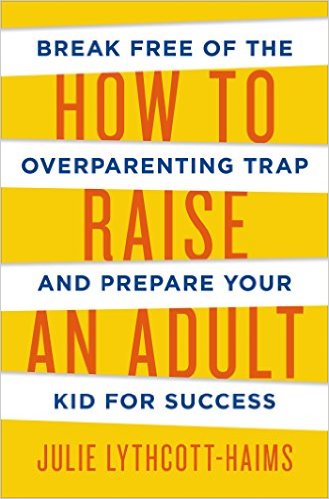The new book taking the US by storm at the moment “How to Raise an Adult: Break Free of the Overparenting Trap and Prepare Your Kid for Success” by Julie Lythcott-Haims looks at how US (and UK) helicopter parenting is reaching fever pitch, with young adults no longer able to do things for themselves.
Across a decade as Stanford University’s Dean of Freshmen, Lythcott-Haims noticed a startling rise in parental involvement in students’ lives. Every year, more parents were exerting control over students’ academic work, extracurriculars, and career choices, often taking matters into their own hands rather than risk their child’s failure or disappointment.
When is the right time to step back and let you kids get on with things themselves, is a question my friends and I often ask ourselves and I have always been a great believer in letting children learn from their mistakes, but we all know in these over achieving times how hard that can be.
Lythcott-Haims illustrates that overparenting doesn’t merely threaten a child’s future income, it also does enormous psychological harm and presents findings that prove that “rates of depression and anxiety among affluent teens and young adults correspond to the rates of depression and anxiety suffered by incarcerated juveniles”.
We seem to have moved so far away from our often almost neglectful “go outside and play and don’t show off” 70s childhoods to a society where its acceptable for parents to call university tutors and ask why their kids grades are bad (maybe because they have drunk the student bar dry every night, relived to be away from their interfering parents). The endless quest for the right schools, best grades, hours of homework/tutoring, wide variety of sports and hobbies, followed by the right university and ultimately successful career, must leave some kids begging for some free time and the chance to screw up once in a while.
When my kids were younger my parenting style veered between doing what I thought I should be doing (i.e. what all the other middle class parents are doing) and doing what I instinctively felt was right. But as I’ve got older (and hopefully wiser) I have learnt to trust my instinct more and since they left school I have tended towards more of a hands off approach. It isn’t always easy, especially when it comes to boys (sexist I know) – as the tendency to do things for them is often overwhelming (why is that?) – but no-one wants to be that mother who is responsible for producing a useless man who can do nothing for himself.
An article on the book in The Telegraph last week listed the signs of over parenting…….which I’m sure we have all been guilty of at some point.
Do you catch yourself saying ‘We’ when talking about your child’s achievements?
When you hear your child being questioned by another adult, such as a teacher, do you have to fight the urge to answer on your child’s behalf – and often fail?
Do you find yourself doing things for your children that they are old enough to do for themselves such as cutting up their food, doing their washing or changing their sheets? Do you avoid asking them because you assume they are too ‘busy’– or because you don’t want a row?
Have you queried you child’s marks at school or university – or repeatedly questioned referees’ decisions at school sport matches?
Do you behave like your child’s concierge even when they are teenagers, arranging their diaries and morning wake-up calls, booking flights for them and organising their financial affairs?
If you left your kitchen in a state and your children in charge when you went away for the weekend, would they leave it as it was, or make it worse?
Do you hold yourself to blame if your child does badly in a subject?
Has your child ever rung you to ask you to look something up for them, when with a little investigation, they could have found out where they needed to go for themselves?
Have you already considered which A-levels your child should take and which universities they should aim for, even before they reach secondary school?
Lythcott-Haims lists three kinds of over-parenting: overprotecting (putting buffers and safety rails in place), overdirecting (managing activities, studies and grades) and hand-holding (acting as a concierge to help fill in paperwork and talking to authority figures on their behalf).
She thinks the secret is to give kids time to think and work out their own problems, as ultimately doing everything for them makes them ill equipped to cope with problems.
Sounds like common sense to me – but after years and years of hovering over our kids making sure everything is ok for them, it can be very hard to do.
You can buy How to Raise an Adult here.






It sounds like a very interesting book, I shall add it to my holiday reads. So true that us 70s kids were benignly neglected compared to todays overly-parented kids. I am the eldest of 5 – 4 girls and a boy – he was/is treated very differently. I had a girl and a boy and promised myself the boy would be made to do the same as his sister. And I have tried very hard to do that – but it takes a more conscious effort to let him get on with it. I wonder why that is?
its a weird thing Sarah. I am exactly the same. I try very hard but somehow I always feel my daughter is more capable. Maybe its because we know ultimately women are!!
J x
I have two boys and I can confirm they are rubbish at stuff !!!! Only joking they are smashing – in fact a lot comes down to personality – older son is responsible and reliable and will do most anything required of him – younger son is a whirlwind non-stop – the tendancy is not to ask him to do things because he is the baby and because you know he’s going to moan like mad about it.
Interesting though, I would say that whilst living in the Middle East we were under huge pressure to helicopter parent, taking full control of our children’s lives and academic sucess, but here in New Zealand, it is all a lot more relaxed, there is the assumption that kids are still quite free, they wander to each others houses, play a lot of sport and school is no the be all and end all of life. Not sure that they will end up being high flying lawyers but they will probably be very happy with a great group of buddies – I know which I’d prefer for them.
It amazes me how women create rods for their own backs. Because I always worked full-time and their father had a long commute I expected my two sons up to do things for themselves and they didn’t know any different! They paired up socks when they were 3, packed their own bags for holidays at 6, used a washing machine from around 10 and I have never ironed a shirt for them since they were 15…and they hoover for me without argument (I think it’s because it’s a gadget and therefore an acceptable male task!) I encouraged them to go to Cubs and Scouts which provide safe environments for adventurous activities and opportunities for self reliance. I took a lot of stick from people for not accompanying them to university open days but felt that they had to make their own choices as to where they wanted to study and if they couldn’t cope with organising travel on their own then I would have been worried that they wouldn’t cope with life at uni. Both have now graduated without mishap, found good jobs on their own initiative and turned into self-sufficient young men who can look after themselves well. They rarely ask for any help from me – often I only hear about problems after they have resolved them – and I think that they will make fine husbands one day. Perhaps I was lucky in that a lot of their friends’ parents had the same approach and as we live in the city centre our children were used to getting around under their own steam from an early age but I do wonder about the resilience of young adults these days. I have a 25 year old girl working for me who takes her washing home to her mother…
Wow – well done Sue, packing when they were 6 is quite an achievement.
J x
Your life in NZ sounds lovely Becky – don’t come back to Britain as helicopter parenting is rife!!
J x
Haha! They didn’t always pack the right things (once there were no spare socks) but they soon learnt… Cub and Scout camps were very good training experiences for self-reliance. Can’t understand women who pack for their husbands either.
What you say about tutoring is interesting. I work as a tutor and I think tutoring breeds an over-reliance on the tutor in the student. A good student is independent and resourceful, they don’t need someone to hold their hand. I find my tutoring increasingly frustrating for this reason, and that’s why I do the other thing that I do: teach study skills to students. I help them develop time management, prioritisation and problem solving skills so they can be effective indepedent students. This is what universities want and also what employers want.
totally agree lucy – its time to leave our kids alone to find their own confidence and skills
J x